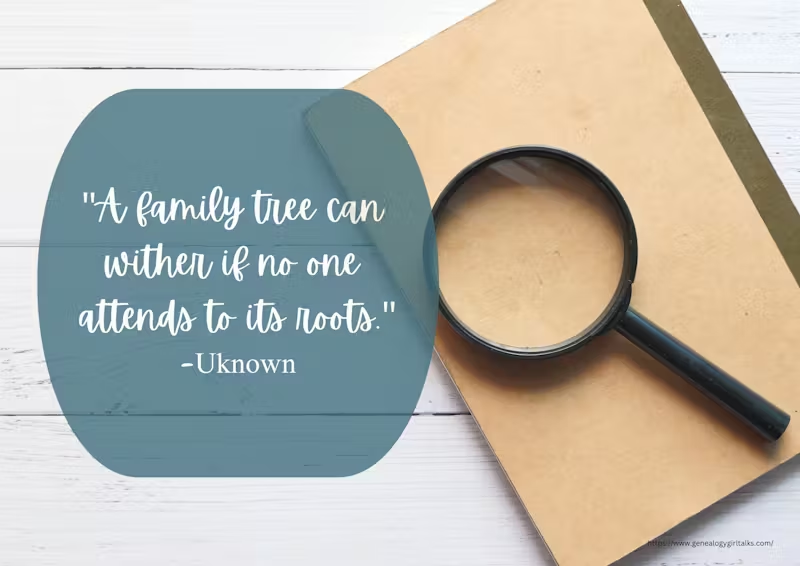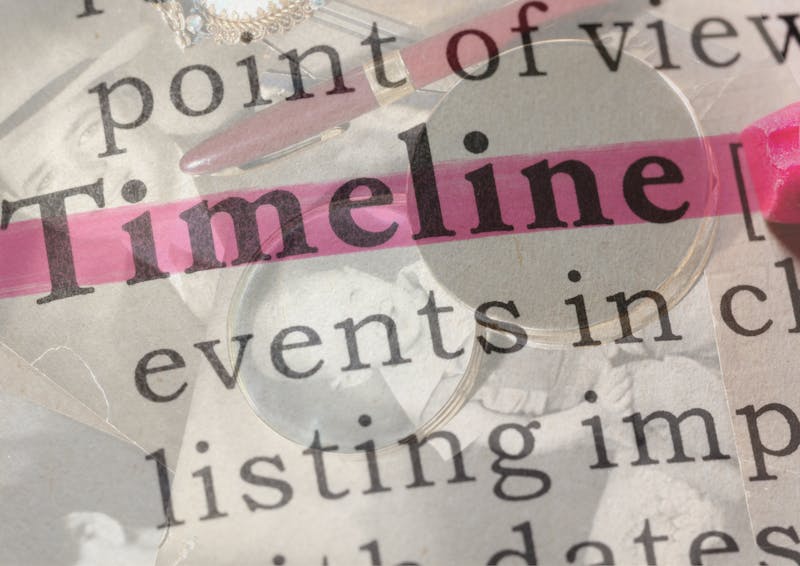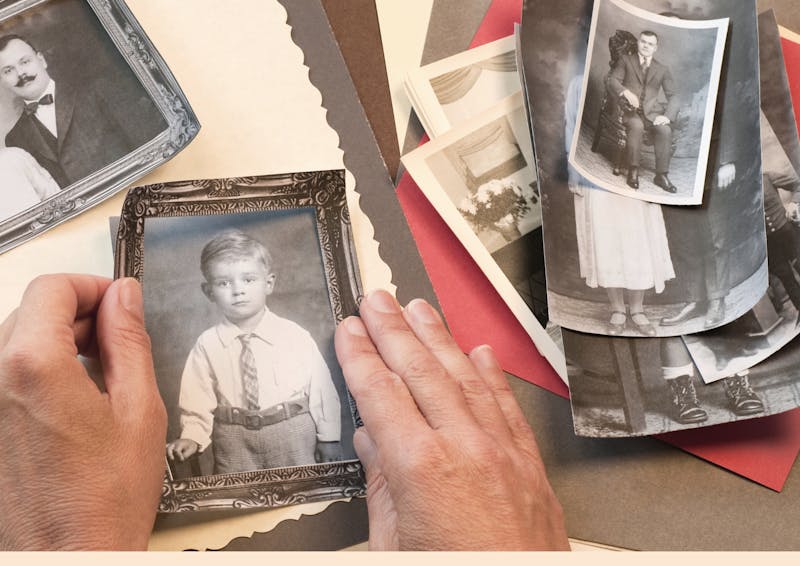Understanding Your Family History & Tips For Curating Genealogy Resources & Research Think like a genealogist with these expert organization hacks

Resources for thinking like a genealogist; expert hacks for organizing your family history information, and tips for presenting your genealogical findings like a true family historian.
So you've downloaded all the family history resources and apps, checked out, and maybe signed up for some genealogy websites. Hopefully, you now have an idea of who your ancestors were or some inspiration sparking your ancestral discoveries. But what do you do with all that information? How do you make sense of your ancestry from the clues you’ve found, and what are the next steps on your family history journey?
This list of family history resources, apps, and genealogy organization tools, is for budding genealogists already on their family genealogy discovery, no matter how far on that voyage you are. We'll give you some resources for thinking like a genealogist and organizing your family history findings. For those who want to share their discoveries with others, we've compiled a curated list of resources for sharing your bloodline findings. Let's get digging!
Expert Hacks for Curating & Making Sense of Your Genealogy Research
Budding family historians know that keeping track of all your ancestral information can be intense; the good news is that if you want to walk in your ancestors' shoes or know more about their lives than their names, dates, and places, you don't need a magical crystal ball, nor do you need to keep enormous stacks of paper in your house. You only need a curious mind, creative investigative skills, and the best tools to build and organize your ancestor profiles through historical timelines, helping you to make sense of the information you’ve gathered.
Expert Hack #1
Engage your critical thinking skills when looking at historical evidence or research, just like you would when playing word games. Pharos Tutors courses and blog have quite a few short courses on critical family research that you can enroll in no matter where you live.
Expert Hack #2
Talk to your living family members! Sometimes the best place to start is closer than you think, so spend time interviewing your family members - they might surprise you. Here are some inspirational questions.
Expert Hack #3
Keep note of citations. Every time you find a new fact or piece of information, write down the details in detail. That way, re-finding documents is easier.
Expert Hack #4
Consider bringing in the experts. If you need to research family records in a particular historical period, region, country, or state, hiring an expert in that particular field or area could save you a lot of time and money.
Expert Hack #5
Keep notes and use a wide variety of apps and tools. Using a wide range of resources to make sense of your family history findings will help you navigate them and offer a new perspective. Family Search has a fantastic article about how to use the genealogical proof standard (GPS) to inspire and curate your genealogy toolbox.
How (and Why) to Build a Genealogy Timeline
Timelines are an easy way to create that ancestor profile, and they're effective, too. The advantage of timelines is they can show you how the family information you've gathered and historical context connect to create a birds-eye view of your ancestors, pointing you toward exciting pathways that could further your genealogy research and keep you from falling into a tunnel vision pitfall, something which is important no matter what type of research you're doing, whether it's about family history or discovering new meanings of words with a letter solver, no matter where you are on the journey or what daily word game you're playing. With that in mind, here's a hand-picked list of our favorite timeline family tree builders so you can easily keep track of all your research–sans paper!
Progeny Genealogy
Genelines timeline software allows you to create up to seven customizable timeline charts; you can display your family history results from a genealogy database, using timeline files from their library, and easily share your findings with family members.
https://progenygenealogy.com/BEEDOCS
BEEDOCS could be your answer to organizing your family research into a concise 3D timeline exclusively for Mac users. You can present historical events, reveal ancestral connections, or build your family tree.
https://www.beedocs.com/timeline3D/mac/Evernote
Looking for a place to keep all your notes without losing them? Evernote could work for you; it's a simple note-taking app you can log in to on any device from anywhere. If you're more of a talker, you can also remind yourself using their audio recordings feature, especially if you're out and about and a genealogy question comes to mind.
https://evernote.com/Timeline Grids
A timeline grid is part of a genealogist's arsenal; it's a research tool to help you keep track of your findings in one place. A timeline grid is mostly based on census, so it helps display research of different countries and periods. Golden Genealogy has free templates you can use to get you started.
https://www.goldenrodgenealogy.com/home.htmSmart Draw
Another great option for building timelines is SmartDraw. If you want an easy solution with built-in templates that you can save directly to your existing setup on Microsoft or Google apps, team, etc., it could work for you. It isn't a free program, but there's a 7-day trial to see if you like it.
https://www.smartdraw.com/Always Think Like a Genealogist (and listen to the experts!)
As genealogy research gains in popularity, so do the number of resources out there designed to help you, which is great for family history beginners and veterans alike, but it can sometimes lead to an overwhelming amount of options, clues, and occasionally incorrect information, that might have you battling to make sense of it to connect your family tree or timeline. That's where listening to the experts comes in handy. Here’s a list of amazing genealogists and family history experts who can guide you through the process, no matter what you want to discover or how you want to go about it.
Ancestry
The popular family history site Ancestry also has a directory of professional genealogists worldwide. They also offer a free research estimate before hiring an expert, so you can check if it fits your budget.
https://www.progenealogists.com/our-expertsCyndi’s List
Still trying to figure out where to start? Cyndi's List is a free genealogy research site that has been running for over 25 years. They have a curated list of geological resources, a list of links to jumpstart your research when you've hit a plateau, and more.
https://www.cyndislist.com/APG
The Association of Professional Genealogists is a not-for-profit organization dedicated to the genealogical profession's professional growth and quality assurance. They provide education and advocacy and seek to protect clients needing professional genealogical services through their genealogists' directory.
https://www.apgen.org/cpages/homeGenerations Cafe
Suppose you're after a space to talk to others about genealogy or want to get tips on how to further your family history research without getting overwhelmed. Amy Johnson Crow’s free Facebook page and Generation Cafe podcast could help you connect with others and discover the joy of family history research.
https://www.amyjohnsoncrow.com/My True Ancestry
If you need some help deciphering your DNA results or taking those results further by comparing your genetic makeup to that of thousands of ancient samples, My True Ancestry is a great resource.
https://mytrueancestry.com/Sharing Your Family History With Others
If you're looking to go beyond the family tree, even if your family history research isn't complete (because let's face it, there is always more to discover), you might have reached a point where you want to share what you've unearthed so far. The following genealogy resources and tips could help you reach and engage with family members, update them with your research progress, and create a long-lasting archive for future generations.
Start a Family History Social Page
A family social page or group is a great place to share photos and documents and ask questions without overwhelming your personal pages. If you want some tips, The Creative Family Historian has a great article on successfully utilizing social media for sharing family history.
Create a Family History Binder or Book
Did you discover a captivating story you must share with your family? Creating a digital family history book or tactile binder is a great way to combine your findings, photos, and stories. If it's online, you can share it with more people, especially if you have family from far away. Crello is a great online app, and it's free. Canva basic is also a free graphic-design tool for your family history books, or if you want an all-in-one solution, Google Slides can help you present, share, and download research PDFs.
Family History Blog
Family history blogging can offer you the flexibility to create and curate your own genealogy content to share your discoveries with your family and the wider community. Your blog can be as personalized as you want! For inspiration, the Family History Guide has loads of genealogy resources, or you can connect with them on Youtube. If you want to hear from experts, Family History Daily is a website where family history writers inspire readers with stories, support, and advice.
Genealogical Competitions
Genealogical competitions recognize the hard work, long hours, and creativity of genealogists and budding family history enthusiasts.The National Genealogical Society has a full list of upcoming awards. For budding young family historians, look at the American Ancestors essay contest.
Donate Your Findings
Information is precious; sometimes, one person's missing link could be gathering dust in your attic or loft. So consider donating your findings or family records to a certified Repository, as your family history could strengthen genealogy databases and resources. The Society of American Archivists has some great tips.
Conclusion
We hope you now have a better understanding of how to organize, curate, and understand your family history research and that you feel inspired to reach out to the experts in the field or take your research to a whole new level.
Ancestral discoveries are never-ending, just like the words in the English language! Did you know that the average person only knows about 20,000-30,000 words when there are over 171,146 usable words in English? Like family history, increasing your word knowledge takes careful consideration, research, and determination, especially for games like Scrabble and Words with Friends. See if our letter solver can help you unscramble your letters into words!
Resources
- Jackson, J.JR. (March 13, 2023) Are you ready to Climb Your Family Tree?
https://comomag.com/2023/03/13/are-you-ready-to-climb-your-family-tree/ - McGowen, A. ( June 10, 2018 ) 10 Genealogy tips I wish I'd known at the start.
https://bespokegenealogy.com/10-genealogy-research-tips-i-wish-id-known-at-the-start/ - Family Search. (September 26, 2017) Why We Need Family History Now More Than Ever.
https://www.familysearch.org/en/blog/why-we-need-family-history-now-more-than-ever - Brian W. Hutchison - A GUIDE TO STARTING YOUR GENEALOGICAL RESEARCH
https://www.gen-find.com/assets/uploads/tracing_your_family_history_741.pdf

About the author
Sarah Perowne
Sarah Perowne is a language and education specialist with over 10 years of experience in teaching and content creation. She has worked with students of all ages in various teaching methods, including those with disabilities and ASD. She sports an acute knowledge and skillset in teaching English as a second/foreign language (ESL) English Language Arts and creating content for online teaching resources, articles, and podcasts.


